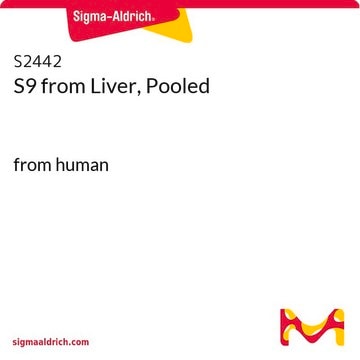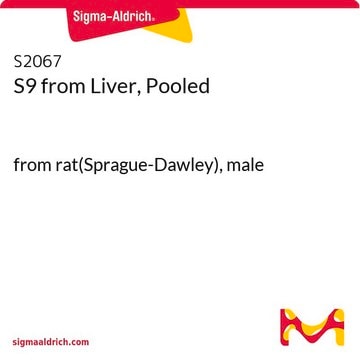M8816
Microsomes from Liver, Pooled
from Monkey(Cynomolgus spp.), male
Synonym(s):
lab equipment accessory
Sign Into View Organizational & Contract Pricing
All Photos(1)
About This Item
UNSPSC Code:
12161501
NACRES:
NB.35
Recommended Products
biological source
Monkey (Cynomolgus spp.)
form
liquid
specific activity
≥5000 units/mg protein
packaging
vial of ~10 mg
shipped in
dry ice
storage temp.
−70°C
Looking for similar products? Visit Product Comparison Guide
Application
Microsomes from Liver, Pooled has been used to measure the in vitro stabilities of the prodrugs. It has also been used in microsomal incubation to generate BTX-3 metabolites to serve as references for liquid chromatography with tandem mass spectrometry (LC-MS/MS) analyses of urine.
Biochem/physiol Actions
Liver microsomes are subcellular particles derived from the endoplasmic reticulum of hepatic cells. These microsomes are a rich source of drug metabolizing enzymes, including cytochrome P-450. Microsome pools from various sources are useful in the study of xenobiotic metabolism and drug interactions.
Microsomal cytochrome P450 proteins can catalyze the transfer of a single oxygen atom to endogenous and exogenous compounds, like steroids and phenobarbital, meant for excretion and detoxification.
Unit Definition
One unit will produce 1.0 picomole of 6 beta-hydroxytestosterone per minute at pH 7.4 at 37 deg C.
Storage Class Code
10 - Combustible liquids
WGK
WGK 3
Flash Point(F)
Not applicable
Flash Point(C)
Not applicable
Certificates of Analysis (COA)
Search for Certificates of Analysis (COA) by entering the products Lot/Batch Number. Lot and Batch Numbers can be found on a product’s label following the words ‘Lot’ or ‘Batch’.
Already Own This Product?
Find documentation for the products that you have recently purchased in the Document Library.
Ann Abraham et al.
Toxicon : official journal of the International Society on Toxinology, 52(2), 237-245 (2008-06-28)
Urine specimens from patients diagnosed with neurotoxic shellfish poisoning (NSP) were examined for biomarkers of brevetoxin intoxication. Brevetoxins were concentrated from urine by using solid-phase extraction (SPE), and analyzed by enzyme-linked immunosorbent assay (ELISA) and liquid chromatography-tandem mass spectrometry (LC-MS/MS).
Biochemistry and cell biology
The Cytokine Handbook (2016)
Kumar Sachin Singh et al.
Nature, 589(7843), 597-602 (2020-12-29)
Isoprenoids are vital for all organisms, in which they maintain membrane stability and support core functions such as respiration1. IspH, an enzyme in the methyl erythritol phosphate pathway of isoprenoid synthesis, is essential for Gram-negative bacteria, mycobacteria and apicomplexans2,3. Its
Our team of scientists has experience in all areas of research including Life Science, Material Science, Chemical Synthesis, Chromatography, Analytical and many others.
Contact Technical Service



